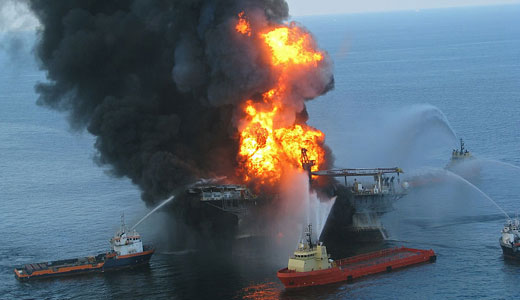
CHICAGO – “Capitalism is fundamentally incapable of dealing with climate change.” These were the words of microbial ecologist Steve McCallister, when asked what the current political atmosphere meant for environmental concerns – and for the future in relation to global warming. What he had to say highlighted the direct ties between political and environmental activism.
McCallister, 28, is a doctoral candidate at the University of Oregon in Eugene, Ore. and a member of the American Federation of Teachers Local 3544, in which he is a shop steward for biology professors. His doctoral thesis is on how methane gas (a major contributor to global warming) is produced, and includes dissertation research on its correlation to peat moss in northern Michigan.
It seemed fit to pose to McCallister, who was here at a union convention this week, a question that is perhaps on the tip of any concerned environmentalist’s tongue: what are the aftereffects of the 2010 BP oil spill, (which produced many poisonous “methane bubbles”), and what does the future look like on that front?
“There’s contamination hanging on in the Gulf,” McCallister replied. “And it’s the deep stuff that will be a big problem, maybe for ten years or more; damage has been done to microscopic life forms at the very bottom. It’s ‘sleeping contamination,’ – and it can be ‘awakened’ by major events – storms, shifts in the earth, for instance – causing pollutants to be reintroduced to areas previously thought to be cleaned up.” As for how long it might take for the Gulf to be entirely pristine again? “Decades,” he offered. “Maybe longer.”
Getting to the root of that problem, McCallister began talking about peak oil, which is a term that refers to “the point at which industrial society reaches its maximum productive capacity,” essentially going over the ‘half-way marker’ on the world’s oil. The truth is, he said, oil production “is not going to give us energy independence at this point.
“From an economic standpoint,” if we continue only the pursuit of oil, “we will see rising energy costs, and an increase in the cost of living that is already being experienced in other countries.”
The bottom line, he said, is that the current capitalist system in the U.S. (unwilling to pursue green energy, as it doesn’t suit immediate corporate interests) just won’t cut it.
The solution starts with, “ending this notion of corporate personhood – the idea that corporations have the same rights as people,” he explained. “They have to be regulated, because their interest is to make a profit in the short range. Meanwhile, the balance of local ecosystems is being sacrificed. The supremacy of people over profits is being undermined.”
McCallister sees replacing capitalism with a socialist system as the key to saving the planet. “In a socialist system, you can plan for the long range and put human needs first.” The labor movement would play an important role in making that happen, he felt.
In response, this reporter posed to him, as an example, a recent dilemma on that front:
The proposed – but delayed – Keystone XL project (a pipeline that would transport oil from Alberta, Canada to the U.S. – putting sensitive ecosystems at risk) was championed by some unions as a job creator. Yet, it served as a source of outrage for environmental activists.
Given that current environmental disruption is a key political problem, could unions and environmentalists work together for a single goal that is beneficial to all?
McCallister thought so. However, “it’s gonna require a level of class consciousness on the part of trade unionists to see eye to eye with environmentalists; they have to see outside the box of capitalism, and understand that short term sacrifices have to be made to achieve the ultimate goal. Socialism will give trade unionists more room to breathe on making those sacrifices.”
But even so, he added, there are ways already in which union members and environmentalists can unite: the development of green jobs is a key in doing that, he said.
“We need to join together,” said McAllister. “We need to declare war on climate change.”
Capitalism is a major roadblock in the fight against climate change, he concluded. “Capitalism can’t think ahead. And as a result, that train is eventually gonna run out of track. It’s just a question of whether we hit the brakes.”
Photo: The Deepwater Horizon explosion and subsequent oil spill was one of the more recent environmental disasters. United States Coast Guard/Wikipedia










